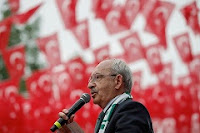Days after Pakistan’s February 08 general election, the
Election Commission of Pakistan released the official results
confirming a major political upset. Contrary to what most political
pundits and observers had predicted, independents aligned with former
Prime Minister Imran Khan’s Pakistan Tehreek-e-Insaf (PTI) won the most seats
at the national level, followed by former Prime Minister Nawaz Sharif’s Pakistan
Muslim League-Nawaz (PML-N), the Pakistan Peoples Party (PPP) and the Muttahida
Qaumi Movement (MQM). No party won an absolute majority needed to form a
government on its own, says a report released by the United States Institute of
Peace (USIP).
The
resultant uncertainty means the United States may have to contend with a
government that is more focused on navigating internal politics and less so on
addressing strategic challenges.
On the one hand, the most likely scenario appears to be a
coalition government that may struggle to muster the political strength to push
through much-needed economic reforms and take on serious governance and security
challenges.
On the other hand, several contenders have raised
allegations of vote tampering that will call into question the credibility of a
future government.
PTI-aligned candidates in particular claim that the delays
in the final announcement of results are evidence of irregularities. Even
before the election, it was clear that the electoral playing field was
being tilted against the PTI.
The US
State Department has noted allegations of interference in the electoral process
and called for a full investigation. In its preliminary report,
Pakistan’s polling watchdog, Free and Fair Election Network, noted that
there was transparency at the polling stations, but it was compromised at the
vote counting and tabulation stage.
Despite not winning the most seats, the PML-N is now trying
to cobble together a coalition government with the PPP and MQM — as these
parties together have a near majority of seats, which is required to form a
government.
It has also nominated former Prime Minister Shehbaz Sharif —
Nawaz Sharif’s brother — to lead the coalition as the new prime minister.
For its part, the PTI has announced intent to form a
government at the center as well as in the provinces of Punjab and Khyber
Pakhtunkhwa, but it is unclear who it will ally with to get the majority
required to form a government.
It is more likely that PTI-aligned candidates will sit in
the opposition in the national assembly, as the party has made clear it will
not ally with either the PML-N or PPP.
The
victory of PTI-backed candidates defies the expectations of political pundits
in Pakistan. It was widely anticipated that the PML-N would win and the PTI
would lose the election.
At the heart of this projection was the state of the
relationship between Khan and Pakistan’s powerful military establishment,
which was seen to be backing the PML-N’s return to power and blocking Khan and
his PTI.
Khan fell out with the military when his government was
deposed in a vote of no confidence in 2022, which he charged was a
regime-change operation orchestrated by the military with the United States.
His party has been in the line of fire since May 09, 2023,
when its supporters attacked military establishments across the country. Khan
himself has been in prison since last year due to several cases charging him
with graft and improper handling of classified information, which meant he was
unable to campaign for his party in the election.
Perhaps most significantly, leading up to the election, the
PTI was also denied its election symbol (a cricket bat) by the Pakistani
Supreme Court, which was widely seen as part of a broader campaign to tilt the
electoral playing field against the party.
The
fact that despite all these measures, PTI-backed candidates won such a large
share is a remarkable outcome, making the 2024 election one of the most
significant elections in contemporary Pakistani history.
One way to read the vote is that the Pakistani people have
rejected the two traditional, dynastic parties — the PML-N and PPP — and
embraced Khan’s aspirational, populist political platform.
Another
way to read the outcome is that it is also a rejection of the military
establishment’s role in politics, in particular its opposition to the PTI and
the clampdown against the party since last year.
The results also point to Pakistanis’ discontent with the
country’s overall trajectory and the electoral process being a solution to the
challenges facing the country.
According
to Gallup, Pakistanis are deeply pessimistic about the country’s economic
future and they also question the fairness of the electoral process —
before the election, seven in 10 Pakistanis said they lacked confidence in the
honesty of the elections.



